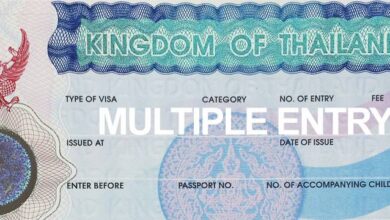Thailand Long Term Visa Options: Which One Is Right for You?

Thailand is more than a tropical paradise—it’s a lifestyle choice for millions of global citizens seeking sun, culture, affordability, and a slower pace of life. From retirees and digital nomads to foreign spouses and investors, Thailand Long Term Visa Options: Which One Is Right for You? the Thai government offers several long term visa options to meet diverse needs.
If you’re considering staying in Thailand for more than a few months, choosing the right visa is the most critical step. In this article, we explore long term visa thailand in 2025, comparing their requirements, benefits, and best use cases. Whether you’re dreaming of a beachfront retirement or launching a tech startup in Bangkok, there’s a path for you.
Why Choose a Long Term Visa in Thailand?
Thailand is consistently ranked among the top countries for expats. Here’s why:
-
Low cost of living: Quality housing, food, and transportation at a fraction of Western prices.
-
Friendly locals: Thailand’s nickname, The Land of Smiles, speaks for itself.
-
World-class healthcare: Affordable private hospitals with international standards.
-
Beautiful geography: Beaches, jungles, mountains—all within hours of each other.
-
Growing expat communities: Especially in Chiang Mai, Phuket, Pattaya, and Bangkok.
If you want to enjoy all these benefits for more than 60 or 90 days, a long-term visa is your best bet.
Overview of Thailand Long Term Visa Options (2025)
Below are the most common types of long-term visas available in Thailand as of 2025:
| Visa Type | Ideal For | Validity | Renewable? | Work Allowed? |
|---|---|---|---|---|
| Retirement Visa | 50+ aged retirees | 1 year | Yes | No |
| Marriage Visa | Spouses of Thai citizens | 1 year | Yes | With permit |
| Elite Visa | High-income individuals | 5-20 years | No (buy again) | No |
| LTR Visa | Investors, skilled workers, pensioners, digital nomads | 10 years | Yes | Yes |
| Education Visa | Students | 3 months–1 year | Yes | No |
| Business Visa | Entrepreneurs, employees | 1 year | Yes | Yes |
Let’s take a closer look at each.
1. Retirement Visa (Non-Immigrant O or O-A)
Best For:
-
Foreigners aged 50 and above
-
Looking for a peaceful retirement in Thailand
Key Requirements:
-
Age: Minimum 50 years
-
Financials:
-
800,000 THB in a Thai bank account, or
-
Monthly income of 65,000 THB, or a combination of both
-
-
Clean criminal record
-
Health insurance (especially for the O-A visa)
-
Address in Thailand
Validity:
-
1-year stay, renewable annually
Pros:
-
Simple process for retirees
-
No need for frequent visa runs
-
Family members can apply for dependent visas
Cons:
-
Cannot legally work
-
Strict financial documentation required
-
Annual renewal required
2. Marriage Visa (Non-Immigrant O)
Best For:
-
Foreigners legally married to a Thai citizen
Key Requirements:
-
Official marriage certificate (from Thailand or legalized abroad)
-
Proof of genuine relationship (photos, shared residence)
-
Financial proof:
-
400,000 THB in a Thai bank, or
-
Monthly income of 40,000 THB
-
-
Thai spouse’s ID and documents
Validity:
-
1 year, renewable annually
Pros:
-
Can apply for a work permit
-
More affordable financial requirements than retirement visa
-
Pathway to permanent residency after 3+ years
Cons:
-
Requires strong proof of genuine marriage
-
Bureaucracy can vary by province
-
Frequent interviews or home inspections in some areas
3. Thailand Elite Visa (Thailand Privilege Card)
Best For:
-
Wealthy individuals who want convenience and long-term stay
-
Frequent travelers, businesspeople, and retirees
Key Requirements:
-
One-time payment starting at 900,000 THB
-
No income or health insurance requirements
-
No age restrictions
Packages (2025):
-
Gold: 5 years – 900,000 THB
-
Platinum: 10 years – 1.5M THB
-
Diamond: 15 years – 2.5M THB
-
Reserve (Invitation only): 20 years – 5M+ THB
Benefits:
-
No 90-day reporting required
-
Fast-track immigration lanes
-
Airport limo services
-
Annual health checkups
-
Concierge services
Pros:
-
Easiest visa to obtain for those who can afford it
-
Longest uninterrupted stay
-
Hassle-free travel in and out of Thailand
Cons:
-
No work permit included
-
High cost
-
No path to citizenship or permanent residency
4. Long-Term Resident Visa (LTR)
Launched: 2022
Best For:
-
Wealthy global citizens
-
Remote workers (digital nomads)
-
Skilled professionals
-
Wealthy retirees
Subcategories:
-
Wealthy Global Citizens
-
Assets of at least $1 million USD
-
Annual income of $80,000 USD+
-
-
Wealthy Pensioners
-
Age 50+
-
Passive income of $80,000 USD/year, or $40,000 with investments in Thailand
-
-
Work-from-Thailand Professionals
-
Work for foreign company
-
Income of $80,000 USD/year
-
5 years of work experience
-
-
Highly Skilled Professionals
-
Work in targeted industries (tech, health, engineering)
-
Annual income: $80,000 USD or $40,000 in key sectors
-
Key Benefits:
-
10-year visa
-
Work permit included
-
17% personal income tax cap (for skilled workers)
-
Easier family inclusion (spouse and children)
-
No 90-day reports (only once a year)
Pros:
-
Ideal for modern professionals and investors
-
Long duration and stable residency
-
Legal permission to work and invest
Cons:
-
Strict income and asset requirements
-
Application handled by the Board of Investment (BOI), not immigration
-
Background check can take 3+ months
5. Education Visa (Non-Immigrant ED)
Best For:
-
Students of Thai language schools, universities, cooking, Muay Thai, or cultural programs
Requirements:
-
Enrolment in a registered institution
-
Tuition payment
-
Attendance mandatory (tracked)
Validity:
-
90 days initially, extendable to 1 year
Pros:
-
Easier to obtain than other long-term visas
-
Can study a wide range of subjects
Cons:
-
No work rights
-
Must regularly attend classes to remain valid
-
Thai language schools under scrutiny in some areas
6. Business Visa (Non-Immigrant B)
Best For:
-
Entrepreneurs setting up a Thai business
-
Foreigners hired by Thai companies
Key Requirements:
-
Job offer or business registration in Thailand
-
Work permit application
-
Company must meet specific capital/employment rules
Validity:
-
1 year, renewable
Pros:
-
Full legal right to work
-
Path to permanent residency after 3–5 years
Cons:
-
Requires employer sponsorship or business capital
-
Work permit and visa handled separately
Special Note: Tourist Visas and Extensions
Tourist visas (TR or Visa Exemption) are not long-term solutions, though they can be extended:
-
60-day tourist visa: Extendable by 30 days
-
Visa exemption (30 or 45 days): Extendable once by 30 days
These should not be relied on for long-term stay, especially in 2025, as immigration is cracking down on back-to-back “visa runs.”
How to Choose the Right Long Term Visa
Choosing the correct long-term visa depends on your personal circumstances:
| Situation | Recommended Visa |
|---|---|
| Retired over 50 | Retirement Visa or LTR |
| Married to Thai national | Marriage Visa |
| High net worth | Elite Visa |
| Digital Nomad | LTR Visa |
| Skilled worker in tech | LTR Visa (Highly Skilled) |
| Language student | Education Visa |
| Starting a business | Business Visa |
Things to Keep in Mind
1. 90-Day Reporting
Most visas require reporting your current address every 90 days to immigration, except Elite and LTR visas.
2. Health Insurance
Required for many visa types, particularly for retirees. Must cover up to 400,000 THB for inpatient services.
3. Re-entry Permit
If you plan to leave Thailand temporarily, apply for a re-entry permit to avoid canceling your long-term visa.
4. Visa Extensions
Ensure you renew before expiry. Late renewals may result in fines or visa cancellation.
Final Thoughts
With a wide range of long-term visa options, Thailand is more accessible than ever for foreigners seeking extended stays. Whether you’re a retiree, remote worker, student, or businessperson, Thailand has a visa pathway tailored to your lifestyle.
Start by identifying your purpose—retirement, work, family, education—and match it to the visa type that offers the best balance of ease, cost, and benefits. In 2025, the Thai government continues to welcome global residents through smarter visa programs and digital-friendly processes.



